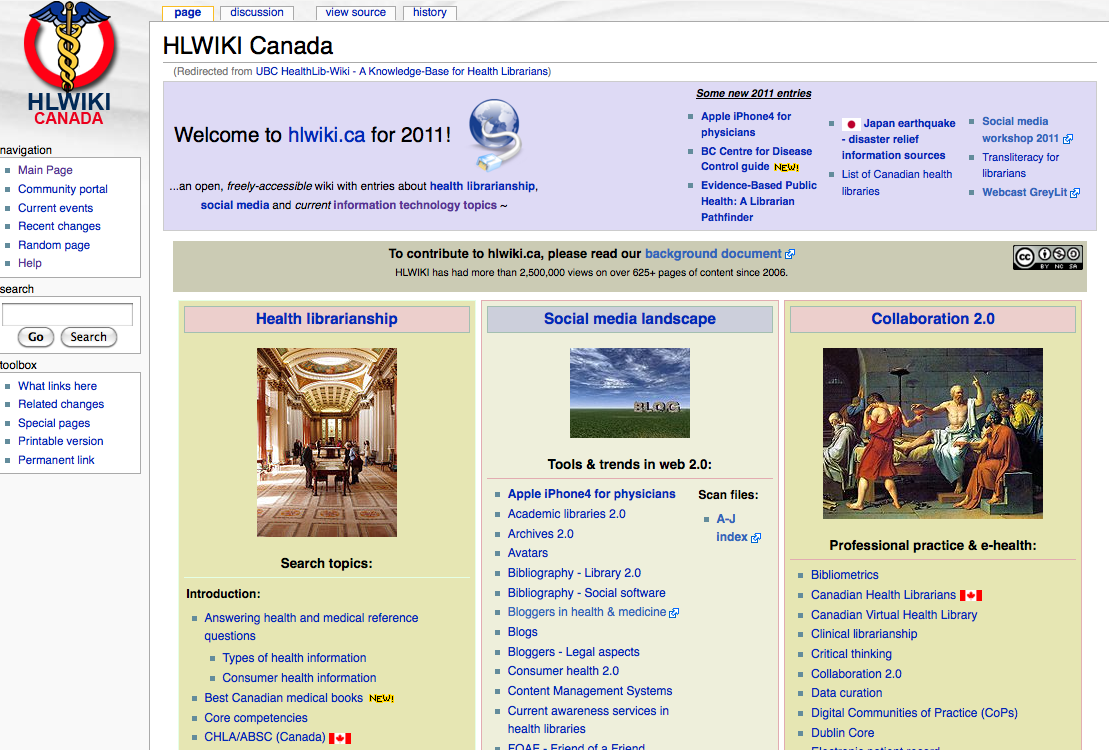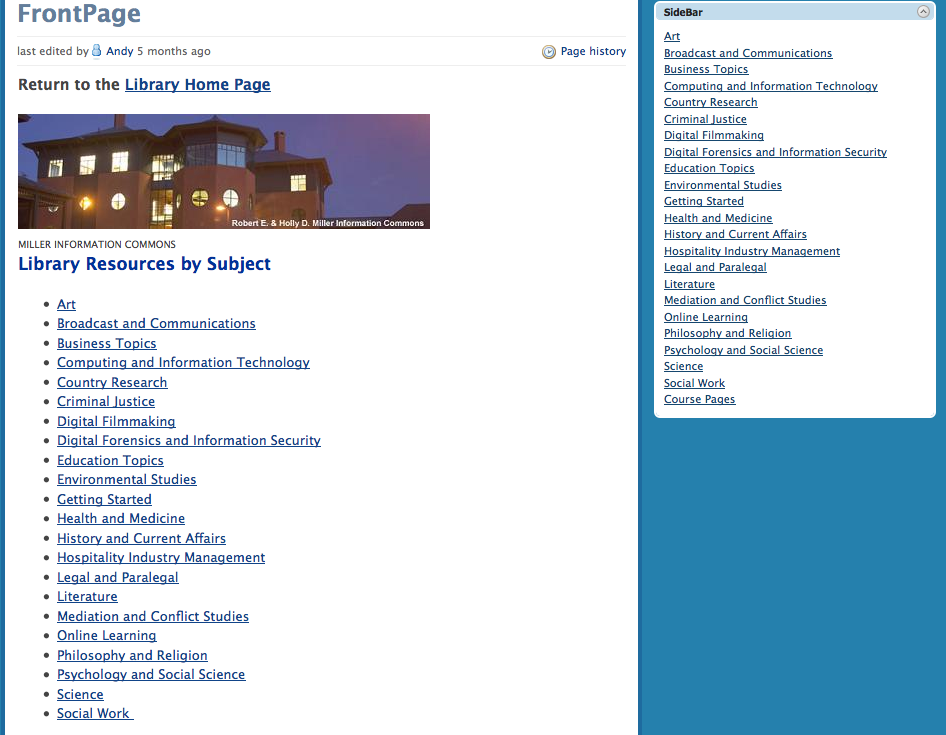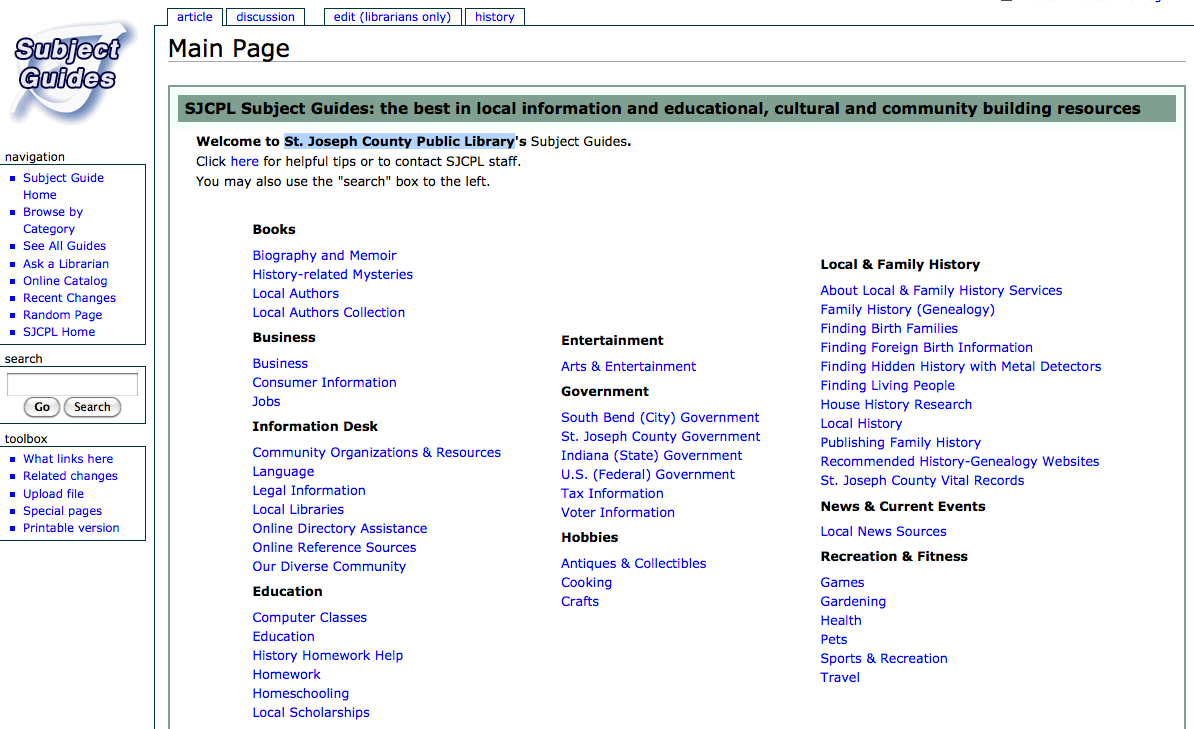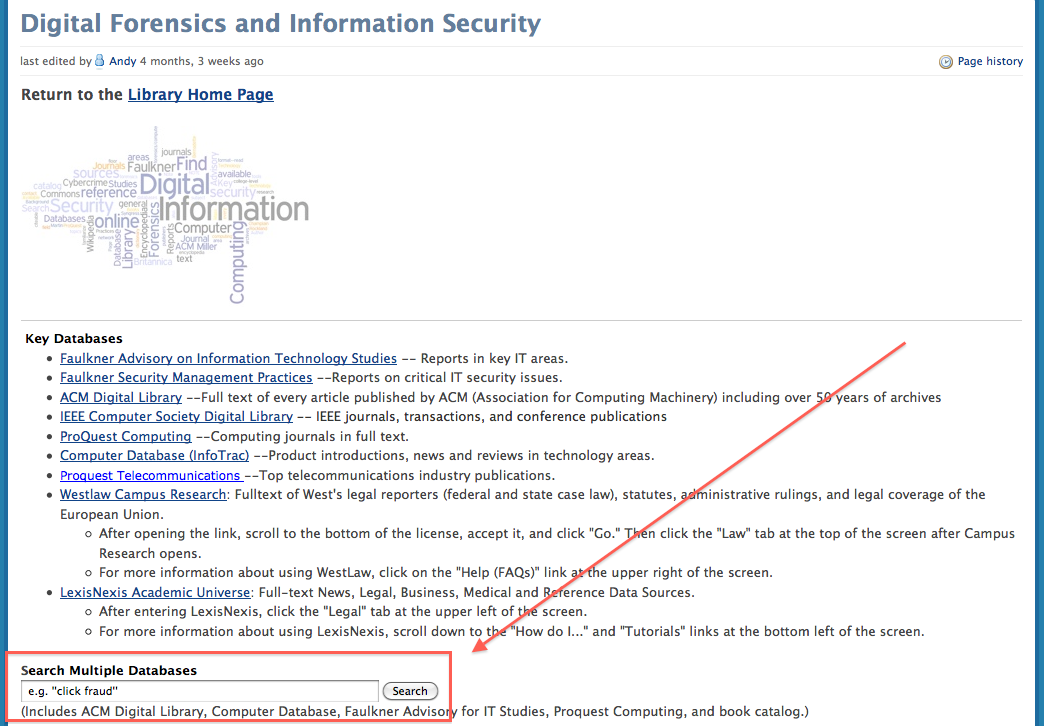According to Meredith Farkas in her 2005 article “Using Wikis to Create Online Communities,” there are many ways that libraries and librarians can use wikis, such as for subject guides, annotating the catalog, as a community portal, or as a collaborative tool for colleagues. Brian Lamb discusses the main objections to the use of wikis in his 2004 article titled “Wide Open Spaces: Wikis, Ready or Not,” and these common criticisms include: the lack of security, the lack of privacy, and the overall organizational structure. The main remedies include community-enforced policies, the option of password-protected access, and use of the search box or “recent changes” page in order to orient oneself.
All right, so it seems pretty clear that wikis can be a powerful tool for libraries and librarians. Let’s investigate this theory with subject guide wikis. Before we do, let’s establish some ground rules for what makes a good subject guide. According to the Library Success Wiki page on Subject Guides, “it is important to point out that a subject guide is not a laundry list of every reference book or Internet link related to a topic. Instead, a truly useful subject guide is a list of carefully-selected resources that will help users begin finding the information they are looking for…it is beneficial to include starting points and explain how the resource is formatted…[and the] topic and purpose of the subject guide should be clearly identified.” Additionally, subject guides should include pointers to catalog resources, reference/bibliographies, indexes/databases, journals/magazines, government documents, and web sources, among others.
I’ll be looking at three different wiki subject guides: the subject guide wiki of St. Joseph County Public Library in Indiana, the subject guide wiki of Champlain College Library in Vermont, and the Health Librarianship Wiki originally part of the 2006 Health and Information Sources and Services course at the School of Library, Archival, and Information Studies a the University of British Columbia. Already we can assume that there is a discrepancy between these resources regarding access. Both the Subject Guide Wiki for St. Joseph County Public Library and the Subject Guide Wiki for the Champlain College Library are easily accessible from each library’s’ main page, under “Research & Information” for the former, and under “Find resources by subject” drop down menu for the later. The HLWIKI, on the other hand, is only accessible via a course link, UBC library website search, or an open web search.
Here are screenshots of the front page of each subject guide wiki:
One noticeable difference between the three wikis is the layouts of the main pages. We have broad academic subject categories for Champlain College Library, broad library and community topic categories for SJCPL, and broad subject columns on health librarianship, social media, and e-health related topics for the HLWIKI. Additionally, HLWIKI and SJCPL are powered by MediaWiki, an open-source wiki software package, and CCL Subject Wiki is supported by PBWorks, a primarily commercial wiki software package that offers a free basic personal account.
Some similar functionality and usability issues involve the left sidebar navigation links. In both the HLWIKI and the SJCPL, there are some nonfunctional links, including “Community Portal,” “Current Events,” and in the case of SJCPL the “Browse by Category” option needs to be fixed. These could be the result of lack of content or lack of use, but more information could be provided so that users aren’t left hanging. The pages of the HLWIKI and the SJCPL seem akin to pathfinders, informative pages of organized links to helpful resources. The CCL Subject Guide Wiki is similar, but offers some contrasting functionalities. Here is an example their “Digital Forensics and Information Security Page”:
Some of the subject pages feature a search bar, allowing users to search journal databases, or the library catalog books and e-book collections. Additionally, the CCL Subject Guide Wiki provides links to specific course pages and thus functions like a kind of integrated course and subject pathfinder tool.
The SJCPL home page offers a rich organization of community resources, including a “Community Connection” search portal to local organizations. Because the subject guide includes a “Community Organizations & Resources” page, it’s difficult to determine where I would search first for information on community organizations. Although, I imagine that librarians at the SJCPL are aware of the differences between these resources, a reference from the “Community Organizations & Resources” subject page to the “Community Connections” search interface might help users. In the case of the CCL Subject Guide Wiki, it’s difficult to assess the overall usability without access to the library database pages. As the subject guides consist of pretty bare-bones links, as a potential user I would be concerned about whether or not additional general information on the indexes and databases is provided by the library.
The HLWIKI appears to be a highly informed online tool for health librarian professionals. The pages are comprehensive and informative, and the wiki is informed and moderated by over a dozen librarians. Overall, the resource is very helpful for general Library 2.0 topics as well as those that are more relevant to e-health and health librarianship. My only suggestion would be to include a link to the HLWIKI from the Library, Archival, and Information Studies library subject guide and either remove the “Community Portal” and “Current Events” navigation links, or at minimum, offer more information for users as to why these pages are without content.
As with other Web 2.0 tools, part of the appeal of Wikis is the decentralized content and user participation. All three wikis restrict access to users’ contributions, although requests for contributions and providing feedback to librarians is permitted. The strength of decentralized content allows multiple librarians to contribute, edit, and modify pages, therefore speeding up the publication process. Whereas community participation might be beneficial to the HLWIKI and the SJCPL Subject Guide Wiki, the CCL Subject Guide Wiki might benefit from allowing faculty members to edit content, particularly as it relates to course resource pages. Lastly, more information about the best way to use each guide and what type of resources to expect may aid the overall findability of resources when searching and browsing is limited to the wiki content.




Trackbacks